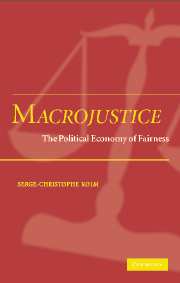Book contents
- Frontmatter
- Contents
- Presentation
- PART ONE BASES: CONSENSUS, FREEDOMS, AND CAPACITIES
- PART TWO OVERALL DISTRIBUTIVE JUSTICE: ELIE (EQUAL LABOUR INCOME EQUALIZATION)
- PART THREE COMPARISONS WITH POLICIES AND PHILOSOPHIES
- PART FOUR THE DEGREE OF COMMUNITY, EQUALITY, RECIPROCITY, AND SOLIDARITY
- PART FIVE COMPARISON WITH ECONOMICS' SOCIAL ETHICS
- 22 Related economic values
- 23 The structure and substance of distributive principles
- 24 Freedom and happiness
- 25 Freedoms, responsibility, desert, merit, equality of opportunity, capacities, capabilities, basic needs
- 26 The theory of equivalence
- 27 Conclusion
- References and bibliography
- Index
25 - Freedoms, responsibility, desert, merit, equality of opportunity, capacities, capabilities, basic needs
Published online by Cambridge University Press: 31 July 2009
- Frontmatter
- Contents
- Presentation
- PART ONE BASES: CONSENSUS, FREEDOMS, AND CAPACITIES
- PART TWO OVERALL DISTRIBUTIVE JUSTICE: ELIE (EQUAL LABOUR INCOME EQUALIZATION)
- PART THREE COMPARISONS WITH POLICIES AND PHILOSOPHIES
- PART FOUR THE DEGREE OF COMMUNITY, EQUALITY, RECIPROCITY, AND SOLIDARITY
- PART FIVE COMPARISON WITH ECONOMICS' SOCIAL ETHICS
- 22 Related economic values
- 23 The structure and substance of distributive principles
- 24 Freedom and happiness
- 25 Freedoms, responsibility, desert, merit, equality of opportunity, capacities, capabilities, basic needs
- 26 The theory of equivalence
- 27 Conclusion
- References and bibliography
- Index
Summary
PRESENTATION
Chapter 22 focused on economic ethics that are, one way or the other, closely related to the obtained results as concerns macrojustice. Chapters 23 and 24 considered the general logical and necessary structure of economic ethical principles, and its various specific manifestations as concerns the structure and the “substance” of the families of criteria. This chapter and the next consider specific principles, respectively based on freedom and on preferences. Freedom is the basis of a variety of basic criteria. Among them, responsibility, desert, and merit relate judgment or allocation to the individual's action. Others consist of specifying the relevant meaning of equal freedom – the concepts of equality of opportunity are among them. Other principles propose that what should exist is what the individuals would have chosen in a putative free choice. When this notional choice is a collective free agreement, this is a theory of the social contract. This includes, in particular,“liberal social contracts” (see Chapter 3), and “fundamental insurance” against the occurrence of facts that are in reality given (theories of the “original position” are particular cases). Of course, rights, the scope of opportunities, responsibility, desert, merit, and social contracts have been the object of social-ethical analysis for centuries. They are forms of the most individualistic social ethics. Yet, the vastly unequal wealths that can result from equal social freedom in free markets led to claims of tangible equality or lower inequality, in the outcome.
- Type
- Chapter
- Information
- MacrojusticeThe Political Economy of Fairness, pp. 438 - 462Publisher: Cambridge University PressPrint publication year: 2004



